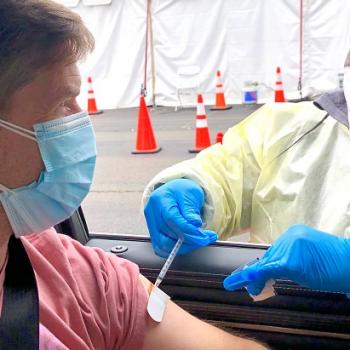Since the late 1990s, the US federal government has stepped up its efforts to stop human trafficking – the trade in human beings, usually for forced labor or commercial sexual exploitation. The primary anti-trafficking legislation is the Trafficking Victims Protection Act (TVPA), passed through Congress in 2000. During his presidency, President George W. Bush described trafficking as “evil” and focused much of his rhetoric against trafficking on what he called the exploitation of women and children. In her new book Other Dreams of Freedom, Yvonne Zimmerman, a professor of Christian Ethics, argues that the theoretical basis of US government anti-trafficking efforts derives directly from Protestant theology and traditional ideas of what she calls “sexually pure and pious womanhood”. Zimmerman challenges this basis for anti-trafficking efforts, saying that it ends up limiting the freedom of trafficked people, especially women, by conceiving of their “rescue” as them ending up in traditional, heterosexual marriages – or at least refraining from sexual relations outside of marriage.
Erik Campano interviewed Yvonne Zimmerman for Patheos.
ERIK CAMPANO:
Let’s begin with the question you ask at the end of your book. If the Protestant model is flawed, “what else can freedom from trafficking look like?”
In a situation in which we’re taking religious freedom seriously, and in a multi-religious public, Protestants can be one voice, but they’re not the only, defining, or dominant voice. I want to open the space for alternatives – to make the case for those who have been dominating the conversation to do more listening.
Why don’t you share your thoughts or dreams about it, briefly? How do you imagine a large-scale solution to the problem?
One of the fantasies that it’s easy to fall into is that there is going to be one solution to any complicated problem. In trafficking, there’s many more smaller interventions that will chip away at this problem, rather that one grand scheme that we can recommend.
I’m hesitant to do too much defining of what freedom looks like, in advance, because I think that it looks different for different people in different circumstances. One of things that I learned early on, working at a rape crisis center with survivors of sexual assault, is that it is always really important to listen and cultivate responses for what they want and need, and be aware that they are not all going to want and need the same thing.
There’s one anecdote in your book that may get to the heart of this tension. And that is about a US faith-based organization, Restore International, working in India. It claimed to have “rescued” sex workers. Then, another local NGO, SANGRAM – which, you point out, has received multiple commendations – said that Restore had removed the women without their consent. The US then revoked funding for SANGRAM. Are these women examples of people who might have a different vision of freedom than the Protestant model?
Yeah, I would think so. Part of what needs to be kept in consideration is that many times when there are recommendations to shut down commercial sex venues – and I don’t want to speak as an expert in Indian culture – but to take these women away and say, we’re going to give you a new life, I don’t think is adequately respectful of the lives they might already have. You can’t assume that they automatically want to do something different. Certainly they may want to do something different, and to the extent that they do, that should be supported. But removing them without their consent is horrifying to me. That smacks of colonialism, in another form.
Would you go further to say that this Protestant conceptualizing of trafficking is, then, a form of colonialism?
I think that’s an argument that is sitting there, waiting to me made. It’s not a far stretch.
So can you give the elevator pitch version of the Protestant influence on anti-trafficking efforts?
In and through the Protestant reformation, theology has a particular way of connecting morality to sex and freedom. It’s not to say that this doesn’t show up in forms that are not Protestant, but that’s particular lineage I am tracing. And this shows up and undergirds quite a bit of US-American cultural, religious, social, and political sensibilities. And I think human trafficking policy is a really powerful case in point of how this happens.
I did notice the lack of mention in your book of Catholicism, which also sometimes has traditional views of women and marriage.
It would be an interesting to study if Catholic theology might undergird this as well, and whether it would be similar or different.
You claim that evangelicals tend to focus disproportionately on sex trade versus labor trade – pointing out that the great majority of trafficked people worldwide are actually labor victims. But evangelicals have condemned both kinds of trade. So where precisely do you see this disproportion?
If you want to tug on people’s heartstrings in particular ways, talk about commercial sex practices. Because there’s this general idea that it’s not a legitimate form of labor under any circumstances, and so when it is coerced and forced, that adds insult to injury.
But we have very different assumptions about labor in American culture, in that labor is good. It’s character-building. This is rhetoric that comes out in a lot of welfare policy. It’s good to work, yeah, you should be paid, but even if you aren’t, or aren’t paid enough, or a living wage to pay for your family or your child’s health care, labor is good. And this has been legitimated with recourse to Christian theology.
And so it’s harder to get people fired up in terms of sustained activism, when you’re talking about tomato-pickers.
And many well -meaning and decent Americans catch their breath when they say, we want people to be paid fairly, but we don’t want our grocery prices to go up. Heaven forbid our construction costs go up for building homes. And yes we want our hospitality industry workers to be paid fairly, but we don’t actually want to pay more to stay in various hotels. As Americans, it’s a pretty deep-seated value to get a good bargain. So when it starts threatening dollar amounts, everyday lifestyles, you get a different set of reactions.
But when it comes to sexually exploited women, that feels less complicated. So that’s one of the reasons that there has been this focus on sexual exploitation. And, honestly, this is coming some twenty, thirty years after the women’s movement, and the anti-violence against women’s movement, which raised these issues in Americans’ public perceptions.
Scholars of labor and race, like Michelle Alexander, might argue that labor in prisons right now, performed primarily by people of color, is an extension of the same kind of racism that existed in the US tracing all the way back to Jim Crow laws and slavery. I’m wondering if that dynamic is also what you are describing in the tolerance of underpaid labor.
That makes a lot of sense to me. Because certainly, issues of race play into trafficking in prominent but complicated ways.
If you say that there’s a natural sympathy toward women involved in sex trafficking, is there a reverse sexism going on there? Are people more unsympathetic to men being trafficked because of some assumption that we make about men – that they are, say, tougher, or disposable?
I don’t think I would frame it as reverse sexism. But I would say that this is one of the things that this way of framing trafficking has a hard time accommodating are male victims, particularly of sex trafficking. So, in that sense, the roles are pretty set. If you’re a woman and a victim of trafficking, the assumption is that you have suffered some form of sexual exploitation. Likewise, if you’re a man and a victim of trafficking, the implied assumption is that it was labor exploitation, not there was some commercial sexual stuff going on, or to the extent that there was sexual abuse, that for men that was secondary – that that was a way an employer manipulated them in order to get more work out of them.
One of the things that falls out of this altogether is the significant amount of sexual minority, transgender, and intersex persons who sell sex globally – global migrants who sell gay, lesbian, and transgender sex. They’re completely invisble. There’s so few studies about them. Because they haven’t registered as a population that would even make sense as victims of trafficking. What we do see is that in the US, runaway, homeless, and street children are being rewritten as domestic, minor child victims of trafficking. But statistically, 46% of homeless runaway and street youths identify as some version of queer. So the frameworks we use are not nearly complicated enough to work with a multi-layered reality.
Are they being trafficked? Almost certainly. The next question is, how many?
For many anti-trafficking organizations, particularly ones funded by more conservative Christians domestically or internationally, you have to agree to their standards and codes of conduct. And there is an assumption of heterosexuality.
You emphasize that feminist thought has also questioned whether sex work is coercive or exploitative. Would you say that that perspective is dealt with in US policy?
US policy assumes, by and large, that by definition exchanging sex or sexual services for money is inherently exploitative. That is an assumption that ought to be checked, or nuanced.
You quote one particular Bush appointee, John Miller, the former head of the Office to Monitor and Combat Trafficking in Persons. You write:
In Miller’s words, “You cannot be a slave to man if you want to have a full relationship with God.” Being in a trafficking situation was in this way rhetorically aligned to bondage to evil. But more than this, this formulation also rhetorically aligned trafficked persons as fettered by and bound to evil. The implication was that trafficked persons’ personal relationship with God are impaired on account of the bondage under which they labor.
First of all — is Miller himself an evangelical?
He’s actually Jewish. We can use him to show the way that religious language has functioned in the Bush and Obama administrations. Many of the critiques of the way Protestant moral sensibilities infuse the anti-trafficking project – more has stayed the same with the Obama administration, than has changed, since Bush.
So even though Miller is not evangelical, you’d say his words represent the evangelical perspective.
On one hand yes, I’d say that, and I’d also say that whenever public officials are talking about this issue, they realize that one of their biggest constituencies are evangelical Christians. So they frame their language in a way that’s not going to alienate them. So what I do suspect – but it’s not something I know as fact – is that Miller’s words had a slightly different balance to a Jewish audience, than to an evangelical Christian one.
So are you saying that there’s a kind of “blaming the victim” going on among evangelicals — that they assume trafficked people are distanced from God in a way non-trafficked people are not?
I wouldn’t characterize it as “blame the victim.” But I would agree that they generally assume that trafficked persons need to be rescued – and, many times, need Jesus.
In your book you discuss Brenda Zurita, who was hired to coordinate Crossing the Bridge, a federally-funded, faith-based organization. I think it’s fair that you describe her as not getting much training for the job, and quoting her as saying that prayer is “the ultimate anti-sex trafficking program.” Can you go into more detail about who she is, or what she represents?
This is an organization connected with Concerned Women for America,a conservative Christian women’s group. Part of what her comments reveal is that they way for some conservative Christians – and this is not what I’d even consider evangelical Christianity, this is conservative Christianity – this is a step yet to the right – for them in many ways, human trafficking is a spiritual problem. So in that sense, they would think about it in terms of spiritual interventions as well, and prayer is the one thing you couldn’t do without. You could do without adequate training, but not prayer. As a religious organization, I do affirm their right to hold that as a belief. My concern is when they are receiving federal funds. I don’t think prayer is among the recognized best practices for fighting human trafficking.
I’m curious if you’ve contacted her in your research.
No. That came from published, public remarks.
Is there an anti-trafficking organization whose work you really respect?
More and more, I have increasing amounts of concern about the term “human trafficking” – the whole rubric, because it is so broad as to be unhelpful, and because so many different scenarios are supposed to fall under this umbrella. So that leads me to feelings of frustration, criticism, or critique of many anti-human trafficking projects.
The things that are effective in combating trafficking are often not framed as anti-human trafficking work. For instance, not too long ago there was a study done with street-based sex workers in New York City. Their number one concern was affordable housing. So when I look at organizations that are doing what I would consider anti-trafficking work that I respect, they aren’t framing it as anti-trafficking work per se, but are looking to address safe and affordable housing, how to lower instances of violence at the hands of police officers, alternative economic development, working with queer youth.
Those are the kind of things that get less press, because we’ve been having a housing crisis in the US for how long now? But that’s where we actually get some traction on the micro things that make people vulnerable to trafficking.
–
Yvonne Zimmerman holds a B.A. from Goshen College, a Master of Theological Studies from Candler School of Theology, Emory University, and a Ph.D. in Religious and Theological Studies from the University of Denver and the Iliff School of Theology. She is Assistant Professor of Christian Ethics at Methodist Theological School in Ohio.
Erik Campano is formerly local host of National Public Radio’s All Things Considered at WSHU in Fairfield, Connecticut. He has also hosted and reported the world news at the public broadcasting networks of both Germany and France.













